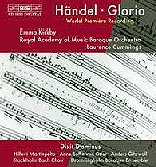The new Messiah! Or so ran the breathless March, 2001 headlines trumpeting the rediscovery of Handel’s Gloria. Well, not quite. The 16-minute, seven-movement work, written when the composer was a callow 22, certainly doesn’t rank among his great works–it’s no Messiah–nor was it exactly altogether lost. It was first mentioned in print in 1983, though the three extant copies’ attribution was then dismissed as inauthentic. (The liner notes offer a short chronicle of the scholastic fury surrounding the piece.) Given Handel’s age, it’s understandable that his writing is occasionally clumsy (which of course is still far better than most composers could ever hope to pull off), although there are some thrilling moments that highlight soprano Emma Kirkby’s technique, and the darkly shaded “Qui tollis” is remarkable (at more than four minutes, it’s Gloria’s longest movement). And even after the frenzy has been tempered, it’s still exciting to be able to add another work, however minor, to Handel’s canon, a fact that the Swedish label BIS kept in mind as it rushed to record this in May, 2001. Kirkby, now 52 years old, continues to possess an amazing agility, particularly in the spellbinding “Laudamus te”, in which she flutters up and down the registers with ease, even if a shade less effortlessly than a few years ago. [Ed. note: Kirkby is featured on another new Handel disc from BIS, a program of sacred cantatas with the London Baroque; you can read our review by typing Q3469 in the box at Search Reviews.] Laurence Cummings’ forces are by turns exuberant and solemn as the score demands, but never ponderous.
The same can’t be said of the pairing, a middle-of-the-road reading of Dixit Dominus from 1986, hastily pulled from BIS’ archives for the occasion. (Like the Gloria, Handel wrote this in Italy when he was 22.) While Hillevi Marinpelto and Anne Sofie von Otter both turn in very fine performances and blend together beautifully in the nuanced duet of “De torrente in via bibet”, conductor Anders Öhrwall plods along, and the chorus is dismayingly messy at times, especially in the opening moments of both “Dixit Dominus Dominomeo” and “Dominus a dextris tuis”. The Dixit Dominus sound is badly muffled, too (it’s nearly impossible to decipher the chorus’ words), a sharp contrast with the clean sound of the Gloria. But all in all, the pairing’s drawbacks are probably a minor concern, especially if you’re seeking this out for the Gloria alone.
































